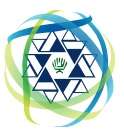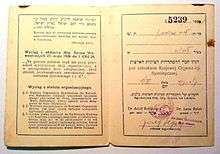World Zionist Organization

The World Zionist Organization (Hebrew: הַהִסְתַּדְּרוּת הַצִּיּוֹנִית הָעוֹלָמִית; HaHistadrut HaTzionit Ha'Olamit), or WZO, was founded as the Zionist Organization (ZO; 1897–1960) at the initiative of Theodor Herzl at the First World Zionist Congress, which took place in August 1897 in Basel, Switzerland. When it was founded, the goals of the Zionist movement were stated in a resolution that came of that Congress and came to be known as the “Basel Program.”
"Zionism aims at establishing for the Jewish people a legally assured home in Palestine. For the attainment of this purpose, the Congress considers the following means serviceable:
- (1) the promotion of the settlement of Jewish agriculturists [farmers], artisans, and tradesmen in Palestine;
- (2) the federation [unified organisation] of all Jews into local or general groups, according to the laws of the various countries;
- (3) the strengthening of the Jewish feeling and consciousness [national sentiment and national consciousness];
- (4) preparatory steps for the attainment of those governmental grants which are necessary to the achievement of the Zionist purpose."."
The WZO currently consists of the following bodies: The World Zionist Unions, international Zionist federations; and international organizations that define themselves as Zionist, such as WIZO, Hadassah, B'nai B'rith, Maccabi, the International Sephardic Federation, the three streams of world Judaism (Orthodox, Conservative, Reform), delegation from the CIS – Commonwealth of Independent States (some states of the former Soviet Union), the World Union of Jewish Students (WUJS), and more.
The Jewish Agency is a parallel organisation, with goals, attributes and leadership closely intertwined with those of the Zionist Organization during the years before the establishment of the State of Israel, and to varying degrees after that. Significant changes to the statutes of both organisations occurred in 1952, 1970 and 1979.[1]
History
Founded as the Zionist Organization (Hebrew: הַהִסְתַּדְּרוּת הַצִּיּוֹנִית; HaHistadrut HaTsionit), or ZO, in 1897 at the First Zionist Congress, held from August 29 to August 31 in Basel, Switzerland.[2] The ZO's journal, Die Welt was founded in the same year. It changed its name to World Zionist Organization in January 1960.
The ZO served as an umbrella organization for the Zionist movement, whose objective was the creation of a Jewish homeland in Canaan - at that time under the Ottoman Empire and following the First World War The British Mandate of Palestine. When the State of Israel was declared 51 years later on May 14, 1948, many of its new administrative institutions were already in place, having evolved during the regular Zionist Congresses of the previous decades. Some of these institutions remain to this day.
Membership and delegations

Membership in the ZO was open to all Jews, and the right to vote for delegates to the congresses was secured by the purchase of the Zionist Shekel. Delegations from all around the world, and from many different political backgrounds and religious traditions, took part in each Congress; delegations/parties were mainly grouped by ideology, rather than by geography.
In 1960 the ZO changed its name to the World Zionist Organization and adopted a new constitution under which individuals are ineligible for membership, which is reserved for organizations.
Presidents of (World) Zionist Organization
- Theodor Herzl: (1897–1904)
- David Wolffsohn: (1905–1911)
- Otto Warburg: (1911–1921)
- Chaim Weizmann (1st time): (1921–1931)
- Nahum Sokolow: (1931–1935)
- Chaim Weizmann (2nd time): (1935–1946)
- David Ben-Gurion (acting): (1946–1956)
- Nahum Goldmann: (1956–1968)[3]
- Ehud Avriel: (1968–1972)
Chairs of the Executive of World Zionist Organization and/or the Jewish Agency for Israel
- Simon Greenberg (1963–1968)[4]
- Louis Arie Pincus (1968–Oct 1973), head of the executive of WZO until 1972
- Yitzhak Navon (1972–1978), only head of the Executive of WZO
- Aryeh Dolchin (Oct 1973–1975), only chairman of the Jewish Agency
- Pinhas Sapir (1975–12 Aug 1975), only head of the Jewish Agency
- Aryeh Dolchin (12 Aug 1975–6 Jan 1976), only chairman of the Jewish Agency
- Yosef Almogi (6 Jan 1976–1978), only chairman of the Jewish Agency
- Aryeh Dolchin (1978–Dec 1987)
- Simcha Dinitz (Dec 1987–14 Feb 1994)
- Yehiel Leket (Feb 1994–Feb 1995)
- Avraham Burg (Feb 1995–Feb 1999)
- Sallai Meridor (25 Feb 1999–2005), "acting" until May 1999, then elected
- Zeev Bielski (2005–2009)
- Avraham Duvdevani (2010–present)[5]
- Yaakov Hagoel, Vice Chairman, former Head of the Department for Activities in Israel & Countering Antisemitism.
In 2009, the positions were separated again. Natan Sharansky was elected as the head of the Jewish Agency and Avraham Duvdevani was elected as the new Chairman of the WZO at the 36th Zionist Congress, on 15 June 2010.
Sister organizations
The finances of the WZO were conducted by the Jewish Colonial Trust (founded in 1899), and acquisition of land was conducted by the Jewish National Fund (founded in 1901).[6]Keren Hayesod (founded 1920) funded Zionist and Yishuv activities prior to the creation of the state of Israel through enterprises such as the Palestine Electric Company, the Palestine Potash Company and the Anglo-Palestine Bank.
World Zionist Congress
The World Zionist Congress established by Theodor Herzl, is the supreme organ of the World Zionist Organization and its legislative authority. It elects the officers and decides on the policies of the WZO and the Jewish Agency.[7] The first World Zionist Congress was held in Basel, Switzerland in 1897.
Jerusalem Program
The platform of the WZO is the Jerusalem Program. The Zionist Council, meeting in Jerusalem in June 2004, adopted this text as the latest version.[8]
Zionism, the national liberation movement of the Jewish people, brought about the establishment of the State of Israel, and views a Jewish, Zionist, democratic and secure State of Israel to be the expression of the common responsibility of the Jewish people for its continuity and future.
The foundations of Zionism are:
- The unity of the Jewish people, its bond to its historic homeland Eretz Yisrael, and the centrality of the State of Israel and Jerusalem, its capital, in the life of the nation;
- Aliyah to Israel from all countries and the effective integration of all immigrants into Israeli Society.
- Strengthening Israel as a Jewish, Zionist and democratic state and shaping it as an exemplary society with a unique moral and spiritual character, marked by mutual respect for the multi-faceted Jewish people, rooted in the vision of the prophets, striving for peace and contributing to the betterment of the world.
- Ensuring the future and the distinctiveness of the Jewish people by furthering Jewish, Hebrew and Zionist education, fostering spiritual and cultural values and teaching Hebrew as the national language;
- Nurturing mutual Jewish responsibility, defending the rights of Jews as individuals and as a nation, representing the national Zionist interests of the Jewish people, and struggling against all manifestations of anti-Semitism;
- Settling the country as an expression of practical Zionism.
Herzl Award
Since 2004, Department for Zionist Activities of the World Zionist Organization bestows the Herzl Award annually upon outstanding young men and women in recognition of their exceptional volunteer efforts on behalf of Israel and the Zionist cause.[9]
Settlement controversy
A document, which was brought before Israel's Supreme Court, showed that private Palestinian land was taken and given to Israeli settlers by the World Zionist Organization. The land in question had been ruled off-limits by Israel. The World Zionist Organization had been acting as an agent of the government in assigning land to Jewish settlers in the Israeli-occupied territories. The Israeli government, to avoid responsibilities under international law, used the World Zionist Organization to settle its citizens in the territory occupied in 1967. The document concerns several homes in the Israeli settlement of Ofra, approximately 15 miles north of Jerusalem in the West Bank. The Israeli Justice Ministry confirmed that the land in question was owned by Palestinians and that the nine houses in question had been ordered demolished. Dror Etkes of Yesh Din said "It's an international organization that is, simply put, stealing land."[10]
References
- ↑ Spencer C. Tucker, Priscilla Roberts, ed. (2008). The Encyclopedia Of The Arab Israeli Conflict: A Political, Social, And Military History. Santa Barbara, California: ABC-CLIO. p. 1095. ISBN 978-1851098422. Retrieved 2 February 2015.
- ↑ See Chapter 2: The Seven Years of Herzl of Zionism – The First 120 Years by the Jewish Agency.
- ↑ "ZIONISM- Timeline of Events". Mfa.gov.il. Retrieved 2008-11-29.
- ↑ Marvine Howe (July 28, 1993). "Obituary:Dr. Simon Greenberg, 92, Rabbi And Conservative Jewish Leader". New York Times. Retrieved September 15, 2011.
- ↑ Jerusalem Post: WZO gets 1st religious-Zionist chairman
- ↑ "Chapter Two The Seven Years of Herzl". Jewishagency.org. Retrieved 2008-11-29.
- ↑ "Zionist Congress". World Zionist Organization. Retrieved 21 Feb 2015.
- ↑ "Jerusalem Program 2004". Wzo.org.il. Archived from the original on July 7, 2007. Retrieved 2008-11-29.
- ↑ "The Herzl Award 2004-2005". Wzo.org.il. Archived from the original on September 27, 2007. Retrieved 2008-11-29.
- ↑ Teibel, Amy (21 June 2009). "Lawsuit brings murky West Bank land deals to light". Associated Press.
External links
| Wikimedia Commons has media related to World Zionist Organization. |
- The Central Zionist Archives in Jerusalem. Collections of the World Zionist Organization.
- WZO – Doing Zionism
- The WZO Hagshama Department (formerly the Student Department)
- The Center for Diaspora Communications & Countering Antisemitism